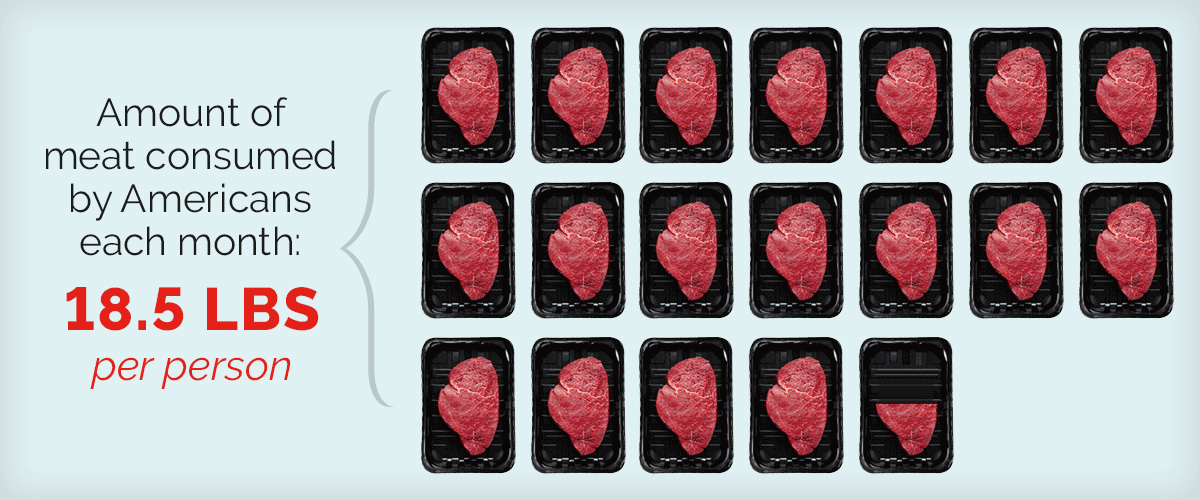How Much Ground Beef Can a Human Safely Eat in One Sitting
How Much Meat is Too Much?
A new study found that men who ate a lot of meat were at increased risk of premature death.

Last year, Americans were expected to consume an average of 222 pounds of red meat and poultry, or the equivalent of almost 10 ounces a day per person. That's the highest amount since 2004.
If you're a man, that might not be such a good idea. That's because a new study has found that a meat-rich diet can lead to premature death.
Finnish researchers looked at the dietary and health data of 2,641 men ages 42 to 60, whom they tracked for an average of 22 years. Over the course of the study, 1,225 of them died.
Researchers found that the men who ate nearly 9 ounces of meat a day (including red, white, and organ meat) were 23 percent more likely to die than those who ate less than 2.6 ounces.
While consumption of protein-rich foods like eggs, fish, and dairy did not affect mortality, researchers concluded that the higher the ratio of meat protein to plant protein in the men's diets, the higher the risk for early death.
To find out what this means for everyday meat eaters – both men and women – we turned to Dr. Shilpa Ravella, a gastroenterologist at NewYork-Presbyterian/Columbia University Irving Medical Center with expertise in nutrition and an assistant professor of medicine at Columbia University Vagelos College of Physicians and Surgeons. Here, she discusses how meat-rich diets can lead to disease and ways to cut back in favor of more plant-based foods.

How does regular meat-eating contribute to premature death?
Based on the scientific evidence to date, we know that red meat and processed meats like sausages, bacon, salami, and hot dogs are not optimal for health since they contribute to chronic conditions like heart disease, cancer, diabetes, and obesity. What's more, red and processed meats are high in saturated fat, which can lead to high cholesterol levels and increase your risk of heart attack and stroke.
One of the biggest ways in which overconsumption of animal products hurts us is that they don't contain fiber, which is only found in plant foods, and which most Americans don't get enough of. Fiber has a slew of remarkable health benefits for disease prevention and treatment, including lowering your risk of heart disease, cancer, diabetes, obesity, and more. It decreases blood cholesterol, promotes satiety, dampens glucose and insulin spikes after meals, improves gastrointestinal health, and optimizes your gut microbiome.
How much meat per day is too much?
In general, the focus should be on dietary patterns rather than specific numbers. The evidence to date supports getting most of your calories from whole plant foods, including fruits, vegetables, whole grains, legumes, nuts, and seeds, as these foods contain the vital nutrients and fiber our bodies need. Aim to fill your plate with as many of these foods as you can, so they make up 90 percent or more of your calories.
For example, there are "Blue Zones" of the world that are home to the longest-living populations on Earth, and all have very similar dietary patterns: They obtain at least 90 percent of their calories from plant foods, eating fish and poultry sparingly. These "Blue Zones" include Sardinia, Italy; Ikaria, Greece; Okinawa, Japan; Loma Linda, California; and Nicoya, Costa Rica.

Does the kind of meat one consumes matter?
Yes. If you do include animal products in your diet, opt for high-quality eggs, seafood, and poultry, avoiding or minimizing red and processed meats. Aim for a Mediterranean-style diet but with the goal of obtaining most of your calories from plant foods.
How will cutting back on meat affect one's health?
Eating a diet with less meat will confer a host of benefits if you replace the calories with whole plant foods. Your blood cholesterol levels will drop. You will optimize your gut microbiome, or the trillions of microorganisms that live in your gut and are crucial for disease prevention and health maintenance. You'll dramatically decrease your risk of getting chronic diseases, including top killers like heart disease, cancer, stroke, diabetes, and obesity. Your gastrointestinal health will improve.
Should folks also be concerned about dairy?
Overconsumption of animal-derived dairy products — or the standard American (Western) diet — can increase your risk for chronic diseases, including breast, ovarian, and prostate cancers, cardiovascular disease, and cognitive decline. Dairy products can be a significant source of casein, which is the main protein in dairy; it facilitates growth and development of cancers. Dairy products may also contain antibiotics and pesticides. Evidence also shows that dairy is not great for bone health. No other species consumes dairy regularly past the weaning period — especially not from another species — and with the growing rise of lactose intolerance, many people find they are unable to tolerate dairy as they used to. If you choose to include dairy products in your diet, aim for high-quality fermented dairy, such as plain yogurt without sugar or other additives.
What are ways to reduce meat intake? Are there substitutes that you would recommend?
Following a plant-based diet doesn't mean giving up your favorite meat dishes. There are many plant foods that are delicious meat substitutes. Opt for whole plant food substitutes whenever possible rather than processed foods. Legumes, for example, are one of the healthiest foods on the planet. You can find recipes that turn lentils, chickpeas, and other legumes into burgers, ground meat, and meatloaf. Minimally processed soy foods like tempeh or tofu are another great substitute. Many vegetables can also sub in for meat, depending on how they are cooked and flavored, including jackfruit, mushrooms, eggplant, and potatoes.
Learn more about digestive health.
Shilpa Ravella, M.D., is a gastroenterologist and directs the Adult Small Bowel Program at NewYork-Presbyterian/Columbia University Irving Medical Center, managing gastrointestinal evaluations and the medical care of adult intestinal and multivisceral transplant patients. She offers an integrative approach to patient care with a focus on nutrition. She is also an assistant professor of medicine at Columbia University Vagelos College of Physicians and Surgeons.
Source: https://healthmatters.nyp.org/how-much-meat-is-too-much/
0 Response to "How Much Ground Beef Can a Human Safely Eat in One Sitting"
Post a Comment